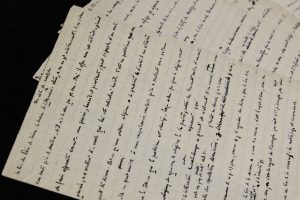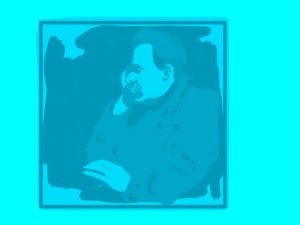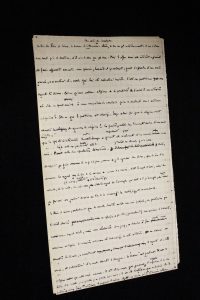By Bernard E. Harcourt
Nietzsche was, in Étienne Balibar’s words, Maurice Blanchot’s “double.” Blanchot (1907-2003) engaged Nietzsche early—shortly after World War II—and throughout the rest of his writings.[1] In La Part du feu published by Gallimard in 1949, Blanchot motivates his multiple essays through the lens of his final chapter, “Du Côté de Nietzsche,” where he dives into the abyss of godlessness. Nietzsche appears, alongside Feuerbach and Auguste Comte, among those who “initiated or organized that world without God.” (PF, 279) In his opus, L’Entretien infini, published by Gallimard in 1969, Blanchot starts and ends his infinite conversation with Nietzsche, lacing the concept of the eternal return throughout his meditations. From the very first page of epigraphs, through the lengthy engagement in the “Limit Experience,” in chapters on “Nietzsche, today” and “Nietzsche and fragmentary writing,” to the end, Blanchot is dialoguing first and foremost with Nietzsche, carefully setting forth the multiple possible readings and engagements on the eternal return (EI, 407-408). Four years later, in Le Pas au-delà, published by Gallimard in 1973, Blanchot would return again and again to Nietzsche’s notion of the eternal return, the organizing theme of that important work on (there is a double meaning here) “the step beyond/outside” or “the not beyond/outside” (LPA, 21, 26, 58, 61, passim).
 Naturally, Blanchot’s engagement with Nietzsche would be mediated through his relation to others, including importantly Sade, Kafka, Rilke, and Hegel, as Balibar notes, but also Mallarmé, Hölderlin, Baudelaire, and René Char, as Annelies Shulte Nordholt reminds us. Yet somehow, it seems, Nietzsche takes pride of place. Like Bataille, Blanchot had been a devout Catholic and Nietzsche’s writings on the death of God were formative interventions, life changing, seismic work. Like Bataille, Nietzsche would have a transformative and life-lasting effect on Blanchot. And through Nietzsche’s aphoristic or fragmentary style,[2] Blanchot’s influence on us would run through the medium of his writing—not just the dimension of fragmentary writing and its relation to aphorisms, but the importance of writing per se as a transformative act and exigency. What Blanchot pushed us to interrogate and explore, through his “Nietzsche double,” is the radical potential of writing itself.
Naturally, Blanchot’s engagement with Nietzsche would be mediated through his relation to others, including importantly Sade, Kafka, Rilke, and Hegel, as Balibar notes, but also Mallarmé, Hölderlin, Baudelaire, and René Char, as Annelies Shulte Nordholt reminds us. Yet somehow, it seems, Nietzsche takes pride of place. Like Bataille, Blanchot had been a devout Catholic and Nietzsche’s writings on the death of God were formative interventions, life changing, seismic work. Like Bataille, Nietzsche would have a transformative and life-lasting effect on Blanchot. And through Nietzsche’s aphoristic or fragmentary style,[2] Blanchot’s influence on us would run through the medium of his writing—not just the dimension of fragmentary writing and its relation to aphorisms, but the importance of writing per se as a transformative act and exigency. What Blanchot pushed us to interrogate and explore, through his “Nietzsche double,” is the radical potential of writing itself.
~~
Both Étienne Balibar and Annelies Shulte Nordholdt, in their presentations, emphasized the radical potential of writing on philosophy and for philosophy—starting from the transformative effect of Nietzsche’s aphoristic anti-dialectical style and adding to that Blanchot’s fragmentary writing form. “Blanchot’s most original move,” Nordholdt tells us, “is probably the idea that writing is a refusal or contestation—we could also say a deconstruction—of the power of metaphysics.” Balibar adds, drawing our attention to an exquisite passage about Sade and systematic thought in L’Entretien infini at p. 228-229, that while Nietzsche’s aphoristic style may still have remained closer to traditional philosophy, Blanchot’s turn to fragmentary writing allowed him to “exceed philosophy:” not to overcome philosophy, but to “make philosophy excessive” “by virtue of the writing.” Writing, Balibar suggests, has “this destructive dimension” on philosophy.[3]
But what of its political potential? What of the capacity of writing to radical transform politics and relations of power? And not merely the concreteness of partisan or electoral politics, but political relations writ large?
There are times in Blanchot’s writing that, it seems, he almost retreats from this political potentiality and, in his later life, from the world of politics. In 1969, for instance, when Blanchot (most likely) writes the introductory note to his Infinite Conversation, one has a sense that Blanchot has already retreated from the political. Writing now turns back on itself, it looks inward—it becomes writing for writing’s sake, no longer in the service of, say, political transformation. “Écrire, l’exigence d’écrire,” Maurice Blanchot emphasized. “Writing, the exigency of writing: not just the writing that has always placed itself at the service of speech or idealist thought, but rather writing that, by its own strength slowly liberated, seems to dedicate itself only to itself.” (L’Entretien infini, vii). “Only to itself”: how does writing that dedicates itself “only to itself” achieve its radical political potential? Or does it? What does the inward movement make possible?
In this epilogue, I would like to suggest some possible answers to this question, which I think is perhaps the most important challenge to what may appear as an ethereal discourse on “writing.” First, in the immediate next paragraph of his note—which again, I can only assume would have been written closest to the time of publication, whereas much of the infinite conversation dated back years—Blanchot suggests that “Writing in this way presupposes a radical change of epochs—death even, the interruption—or, to speak hyperbolically, “the end of history,” and, in that sense, it passes through the coming of communism, recognized as the ultimate affirmation, communism always being still beyond communism.” (EI, vii-viii). This is not, of course, a reference to the French Communist party, which well before 1969 had been disavowed by most public intellectuals for its Stalinist tendencies. Of course, Blanchot is not referring here to existing communist parties or regimes. He is referring to a beyond that is still unknown, and to a notion of community. But it is simply astounding that he would use the word “communism” three times in one sentence in the final paragraph of his note. Particularly given the timing of his writing—right after the student uprisings of May ’68 which so affected Blanchot.[4] The timing gives these words a particular resonance. Even more, coming from a man who began his career before the war as the editor of a right-wing newspaper, Journal des débats, and wrote as well for the extreme right monthly magazine Combat. One can only infer from these passages in L’Entretien infini that the radicality of writing goes beyond philosophy to politics. But what is that political dimension? And how does this exigency of writing, that somehow goes beyond “the service of speech or idealist thought,” relate to the need to specify political argument or juridical analysis?
Second, then, the answer must connect to Blanchot’s attraction to the “outside.” As Annelies Shulte Nordholt reminds us, the exigency of writing leads Blanchot to a form of writing “that we could say is outside discourse, outside language.” (EI, vii). In a similar vein, Foucault wrote of Blanchot in terms of “The Thought from Outside”—and it is this notion of going outside, beyond, to the limit, that Foucault found most promising in Blanchot’s work. Foucault writes, of Blanchot, “Attraction is no doubt for Blanchot what desire is for Sade, force for Nietzsche, the materiality of thought for Artaud, and transgression for Bataille: the pure, most naked, experience of the outside.”[5]
Foucault placed Blanchot at the end of a long line of thinkers who are formative to him in thinking from the outside—Nietzsche, Mallarmé, Artaud, Bataille, Klossowski, and Blanchot—all of whom reflected on the present by reaching beyond or exploring the limit. All of whom deployed language to reveal, in Foucault’s words, “the sparkle of the outside.” (MB, p. 18). Foucault would tell us that “Blanchot is perhaps more than just another witness to this thought. So far has he withdrawn into the manifestation of his work, so completely is he, not hidden by his texts, but absent from their existence and absent by virtue of the marvelous force of their existence, that for us he is that thought itself—its real, absolutely distant, shimmering, invisible presence, its inevitable law, its calm, infinite, measured strength.” (MB, p. 19)
As for what this “outside” might consist of, Blanchot at times gives us an indication. Blanchot’s discussion of the eternal return, for instance, is telling (esp. EI, p. 407). As he suggests, “L’Éternel Retour est une pensée folle pour Nietzsche. C’est la pensée de la folie, et il la redoute au point de s’effrayer d’avoir à la porter…” (EI, p. 411). Foucault, for his part, can be read to suggest that the outside hides in those “placeless places, beckoning thresholds, closed, forbidden spaces that are nevertheless exposed to the winds, hallways fanned by doors that open rooms for unbearable encounters and create gulfs between them across which voices cannot carry and that even muffle cries; corridors leading to more corridors where the night resounds, beyond sleep, with the smothered voices of those who speak, with the cough of the sick, with the wails of the dying, with the suspended breath of those who ceaselessly cease living; a long and narrow room, like a tunnel…” (MB, p. 24). These are the spaces of the asylum, the prison, the hospital ward, the clinic, the closet… la vie des hommes infâmes. These are the spaces that Foucault would inhabit in all his writings. The outside, the abnormal, the limit: in this sense, writing and thinking from outside can be a radical political act—and can serve as a model for politics.
Third, even more, writing, the written word, the text, books bear radical potential, magical power. Michael Taussig, who will speak next seminar on Gilles Deleuze, has a brilliant chapter on “books of magia” in his work, Shamanism, Colonialism and the Wild Man. What he shows there is the way in which the written word trumps, how it exercises remarkable power. “The book of the Church, nature as the book of the Lord, the books of law, writing, paper atop official paper—these leak magic into the hands of the people they dominate” (Taussig Shamanism, page 264). Taussig discusses B. Traven’s ideas in The Rebellion of the Hanged, that in order to have a real revolution, one has to set on fire all the words, all the papers, all the laws, and seals and records—the vital records, the land records, the judicial records. (and somewhat ironically, Taussig adds, through the voice of a wise one, that “with regard to burning papers I have read nothing. That’s not written in any book. I discovered that in my own head.” (Quoting from B. Traven, in Michael Taussig’s Shamanism, Colonialism and the Wild Man, page 263)).[6]
What is that magical power of the written word? In his essay, “Blanchot l’insoumis,” in Blanchot dans son siècle [Colloque de Cerisy], (Lyons, 2009, p. 289-314), Étienne Balibar brilliantly demonstrates the power of Blanchot’s writing: one of the principal authors of an influential tract from 1960—the Manifest of the 121, known formally as the Déclaration sur le droit à l’insoumission dans la guerre d’Algérie (Declaration on the right to insubordination in the context of the Algerian War)—signed by 121 public intellectuals, that often would be wrongly attributed to Jean-Paul Sartre. It was instead Blanchot’s pen that moved so many. It was his writing that had such deep political effects. Yes, the writing. Perhaps, in the end then, “writing that, by its own strength slowly liberated, seems to dedicate itself only to itself” may also ultimately serve “speech or idealist thought.” (L’Entretien infini, vii) For some writers—and I have some in mind, you may have others—this is undoubtedly possible. It is real. (And it remains ever changing. In our most immediate present in the West, for instance, new writing challenges arise with the Internet and, increasingly, the need to sculpt prose in less than 140 characters. This is the new Twitter haiku, which some politicians seem to master more than others).
To conclude with Blanchot, we may return to the very last sentence of his introductory note to L’Entretien infini: “Écrire, sous ce point de vue, est la violence la plus grande, car elle transgresse la Loi, toute loi et sa proper loi.” (EI, p. viii) Writing, he suggests, is the greatest violence—that, I take it, has radical political potential.[7]
NOTES
[1] For details, see Leslie Hill, Maurice Blanchot and Fragmentary Writing: A Change of Epoch (Continuum, 2012), p. 31 et seq.
[2] There is ongoing controversy whether to acknowledge Nietzsche’s aphoristic style or to call it “fragmentary,” which is of course the source of profound debates and discussion between Nancy, Lacoue-Labarthe, Derrida, etc., as we will see in later seminars.
[3] For an excellent further discussion of this, see Leslie Hill, Maurice Blanchot and Fragmentary Writing: A Change of Epoch (Continuum, 2012), p. 33-37.
[4] See, e.g., Maurice Blanchot, “Michel Foucault as I Imagine Him,” in Foucault/Blanchot (Zone Books, 1987), p. 63-64.
[5] Michel Foucault, “Maurice Blanchot: The Thought from Outside,” in Foucault/Blanchot (Zone Books, 1987), p. 27.
[6] The idea of needing to burn the written word also reminds me of this passage in “L’expérience-limite,” where Blanchot, writing about those who betrayed Nietzsche, writes that “On aimerait recommender aux écrivains: ne laissez rien derrière vous, détruisez vous-memes tout ce que vous désiez voir disparaitre, ne soyez pas failbes, ne vous fiez à personne; vous serez nécessairement trahis un jour.” (EI, p. 207)
[7] On this question, Annelise Shuldte-Nordholt also recommends that we read Avant dire by Michael Holland, that just came out last summer.


